08.30.11
Posted in Apple, GNU/Linux, Google, Microsoft at 8:01 am by Dr. Roy Schestowitz

Summary: Microsoft takes the Apple approach to pushing Java/Linux aside while Nokia gets more litigious as well
POOR Microsoft and poor Apple. They just do not know how to stop Linux anymore, so they join forces and attack en masse with help from patent trolls. Pay attention to what the Microsoft-led Nokia is doing right now. To quote: “Nokia (the Claimant) filed a claim with the Shanghai No. 1 Intermediate People’s Court (the Court) against Shanghai Huaqin Communication Technology Co., Ltd. (the Defendant) for RMB10 million in damages on the ground that the Defendant had infringed the Claimant’s rights of a patented product, which was a telecommunications device equipped with a camera.”
More patent aggression against phones. Not to mention Apple's appalling behaviour, which ended up in embargo after pathetic lawsuits. Apple ignored all prior art and tried to stifle the presence of competition (“Galaxy Tab delayed Down Under” says one news report).
Apple’s embargo culture is not paying off because the dispute that Apple has started results in Samsung not helping Apple in manufacturing anymore. It was reported last week that Apple already suffers shortages as a result. But guess who else has just embarked on the embargo ship? Yes, it’s Microsoft. The target is Google’s Android, making it the first time that Microsoft uses this level of sanctions against Linux, having tried it against hardware several years ago (mice from Asia). This embargo attempt was covered by Edward Qualtrough, among others. To quote:
Microsoft have joined the major technology corporation suing party and launched a suit to prevent the sale of Motorola mobiles in the US.
With each technology giant seemingly suing each other in a Royal Rumble-style lawsuit, Microsoft believe their latest action will ban a number of Google-owned Motorola phones in America, which Microsoft claim infringe upon seven patents. These include ways to synchronise calendars and contacts, as well as notifying applications of changes to signal strength.
Motorola phones are made overseas, despite Motorola being an American company, and the International Trade Commission could prevent the products reaching the States. This could pave the way for Microsoft to then argue their case in other markets.
This just shows how miserable Microsoft has become. We really need to get rid of those parent monopolies. The USPTO+ITC are out of control. █
Permalink
 Send this to a friend
Send this to a friend
08.29.11
Posted in Apple, GNU/Linux, Google, Microsoft, Patents at 6:28 am by Dr. Roy Schestowitz
Duopoly ignored, overlooked, or simply defended by a harmful conspiracy of silence?
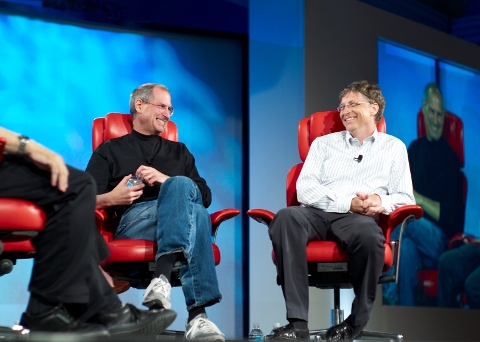
Photo by Joi Ito from Inbamura, Japan
Summary: More patents-hostile coverage from respected publications, but the role of monopolists is de-emphasised, which helps corporations but not parasitic NPEs
WHILE the corporate press celebrates Steve Jobs’ patents (which are being used offensively, to embargo competitors), other sites that are far smaller — like blogs — do a good job explaining to the public that patents are nothing to be proud of. Well, “patent abuse crushes innovation,” explained Bob Chandler yesterday, noting that: “Many software ideas have patents that are controlled by patent trolls. Others are controlled by large software corporations or industry consortia. What makes it even more complicated is that many software patents conflict or obviously have been covered by prior art. Since the 1990s, the United States Patent and Trademark Office (USPTO) has been flooded with software patent applications, to the point where very few of them have actually been examined in detail before a patent was issued.
“So, if you happen to have a nifty new idea for some new software or a new web service, you’d better hire an army of patent lawyers. As soon as you release your software or service, someone is going to sue you. Or, to make the patent trolls go away, you agree to pay them “licensing fees.”
“Since the 1990s, the United States Patent and Trademark Office (USPTO) has been flooded with software patent applications, to the point where very few of them have actually been examined in detail before a patent was issued.”
–Bob Chandler“The other development that “When Patents Attack” takes a look at are the large tech companies like Microsoft, Apple and Google who are amassing large collections of patents. These patents are both offensive and defensive weapons that they use against each other.”
And guess what? Yes, even the BBC’s Natalio Cosoy has decided to address the subject (the BBC is usually promoting copyright and patent maximalism), but only because of patent trolls. And to make matters worse, they extensively quote a pro-software patents lobbyist, Florian Müller. The author quotes the soccer lobbyist as “Intellectual property analyst” (who has no qualifications at all in the area) and does not name the source of the patents, which link back to Microsoft (via IV). The author at least mentioned the EFF and Groklaw, although by an indirect narrative (“He also pointed to a blog post by Groklaw (which does not belong to Google) that details an initiative Google has taken to try to curb Lodsys’ actions.”). As for the lobbyist, he still spins this against Google and does not give Microsoft or IV any flak at all. The portrayal of Lodsys as a “lone wolf” is misinforming the public. It’s the usual spiel.
Over at O’Reilly Radar, a writer who used to promote software patents in there is now emphaising or subtly implying that Apple only ever succeeded because it exploited Free software. Quoting his conclusion:
The impacts of broad, leaderless, idea-based movements are often surprising and hard to trace, and that’s true of open source and free software. The triumphs of Steve Jobs demonstrate this principle–even though free software is the antithesis of how Apple runs its own business. Innovators such as Andrew Tridgell, with Samba and rsync, just keep amazing us over and over again, showing that free software doesn’t recognize limits to its accomplishments. A lot of computing history would be very different, and poorer, without it.
Ironically, Apple is now attacking Free software in the courtroom. It is attacking the very same thing without which Apple would probably be bankrupt. Yes, Apple not only attacks Linux and Android; by taking on companies that sell these it is also attacking — indirectly — everything else that’s mounted onto the platform, including Samba and rsync. “Patent wars gone MAD” says the headline of this new article which starts by mentioning Apple’s attack on Android devices:
Samsung, currently defending itself against a legal move by Apple to have four Samsung smartphones and tablets banned from America due to alleged patent infringement, pointed to tablet-style computers in Stanley Kubrick’s classic 2001: A Space Odyssey.
Samsung claims the 1968 Kubrick version is an example of “prior art”, a forerunner to the tablets of today. See the embedded video clip below and make up your own mind.
The move comes hot on the heels of headlines charting the enormous recent activity in patent acquisitions and patent infringement proceedings in the mobile telecommunications arena.
“Nortel patents sold for $US4.5 billion”, we read one day; ”Apple sues HTC for infringing on 20 iPhone patents”, the next.
In a new editorial from Dallas (near the patent trolls’ paradise), the title today reads “Patent trolls get rich by killing jobs and robbing consumers”. But what about Jobs? What about Steve Jobs killing jobs as we explained earlier this month? Apple too is no better than a patent troll anymore; the same goes for Microsoft. To make matters worse, they collude to defend their duopoly. █
Permalink
 Send this to a friend
Send this to a friend
08.25.11
Posted in Apple, GNU/Linux, Google, Microsoft, Patents at 11:30 am by Dr. Roy Schestowitz
Soccer lobbyist Florian Müller still pretends to be an IP expert, deceives journalists, gets exposed
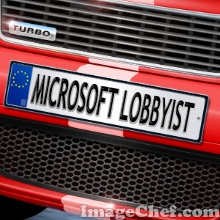
Summary: The campaign to misinform journalists (and thus the public) is not working as Steve Jobs quits his position and Android continues to gain very rapidly
WHAT the mobile war (and we include tablets in this category) has at stake is perhaps the future of computing as the battle for the client end (nodes) affects what happens in the back room, as the OIN’s CEO has stressed in my conversation with him last night. This is why Microsoft and Apple have been so focused on attacking Android and have paid a little less attention to GNU/Linux as of late. “Android Leads All Mobile Platforms with 61% Share” says a headline that was found this morning, so the sense of urgency at Microsoft and Apple is easy to understand. This is becoming a FOSS world where platforms are not proprietary anymore (applications are another matter). Apple and Microsoft are both attacking Linux and FOSS-based platforms, driving them away (even neutralising Nokia in the process, before MeeGo is ever truly launched) and we do, to a certain extent, depend on Google’s ability to defend itself in court, with or without the OIN. “When Silicon Valley fights, patents are the deadliest weapon” says this headline from CNN in an article that notes: “Apple, for instance, recently found itself on the losing end of a patent-related legal fight with Nokia. After almost two years of wrangling, Apple agreed in June to end the battle with a one-time payment of more than $600 million to the Finnish mobile giant. Apple will also pay Nokia royalties for each iPhone sold.”
“Now that Apple is pushing for a ban of Android devices, solutions to the problem are being sought not just inside Google (plus Motorola) and Samsung.”This is of course opening the door to Android extortion, as we argued before. They are trying to normalise and to validate the smartphones thicket, which they keep making thicker and thicker (e.g. with the Novell and Nortel patent acquisitions).
Now that Apple is pushing for a ban of Android devices, solutions to the problem are being sought not just inside Google (plus Motorola) and Samsung. The Economist has this new article which says: “Kent Walker, one of Google’s senior lawyers, grouses at being forced to spend a lot of money defending the company against frivolous lawsuits by rivals. Others counter that as computing goes mobile, it favours information-technology firms that have invested in research for years and that Google was naive—or idealistic—to broaden its IT business without having a stack of patents. There is a retort to that, too: that incumbents can use patents as barriers to entry, which is why America’s antitrust regulators are showing interest in them. In April the Department of Justice demanded changes to Novell’s patent sale to protect open-source software.
“Nowadays, innovations in IT usually rely on many small improvements involving numerous technologies, which means it is not always clear precisely which inventions a patent covers. The open secret is that everyone infringes everyone else’s patents in some way. This creates an incentive for firms to build up their patent portfolios to strengthen their position in negotiations, leading to what some liken to an arms race. The legal tussles usually end in cross-licensing deals, in which small sums of money change hands. This is considered preferable to a mutually destructive exchange of endless lawsuits.
“The patent battle has become more contentious than ever. One reason is the mobile phone has provided a new platform of computing that firms want to dominate. Also, such a backlog of applications built up at America’s patent office (now more than 1m, with a waiting time of around three years) that standards slipped. Dubious patents were granted, helped in part by court rulings that allowed patents to stand on some software and “business methods” that many thought no one could lay claim to. In Europe and Japan, where patentability standards are higher, this is less of a problem.”
“Reuters is WRONG. Case is NOT decided. Journalists, start THINKING instead of quoting!”
–Jan WildeboerThe president of the FFII has meanwhile found another ludicrous patent that somehow made its way through the ever-more-laughable USPTO. He also quotes Reuters as saying that “Samsung gets boost from Dutch court, Jobs resignation” (sadly, Reuters had been fooled by a lobbyist in another article where it failed badly like the BBC, but we won’t feed that article with a URL).
One of the more prominent people to expose the lobbyist right now is his former boss, Jan Wildeboer. Quoting some of his latest tweets, we have:
“Ofcourse @fosspatents claims Samsung is on the looser side. What else? Yesterday he was like so right with that  </sarcasm>
</sarcasm>
“Reuters is WRONG. Case is NOT decided. Journalists, start THINKING instead of quoting! #ApplevSamsung
“Most disappointing is that the press cannot betrusted. They quoted Reuters #fail over and over. #Applevssamsung
“Oooh. Apple wants to add competitive argument in Düsseldorf, judge not happy. Apple losing? #ApplevsSamsung cc @neeliekroeseu
“Another BOOM via @andreasudo BREAKING: wow! Samsung says it has compiled 27 (!) examples of distorted pictures in Apples …”
“OMG! Apple accuses Samsung that pix on their webiste are enhanced to make stuff look better. They woudl NEVER do that, right?
Why do journalists still print what this soccer lobbyist is claiming? Because he knows how to lobby themoif course, he is an experienced lobbyist with credentials as a lobbyist. The matter of fact is, Apple has mostly failed to block Android and almost all the Android phones that sell in big quantities are from Asian companies. That’s the growth area and the target OEM base. Apple is now coming to grips with the fact that manufacturers like Samsung don’t depends on Apple anymore. Apple is losing market share and the attacks on Samsung are said to be leading to supply shortages (Apple needs Samsung for production, but it made Samsung angry). On the same day that Apple pretty much loses in Europe, its CEO, Steve Jobs, is quitting, having said or at least insinuated quite famously that when he no longer manages Apple well enough he will leave. So it’s self-explanatory, right?
Meanwhile in Asia, one of the larger manufacturers of Android phones is collecting a huge number of patents. Quoting Reuters again (despite it being deceived by a lobbyist these days):
China’s telecom giants are building up a war-chest of patents to help give them an edge in the legal battles raging between the world’s smartphone makers, aided by Beijing’s push to transform the country from workshop to innovator.
Mike Masnick is meanwhile kind enough to let us know that “Debate On Software Patents Fails To Convince Silicon Valley That Patents Increase Innovation”. Excellent news which starts as follows:
Yesterday, I went to the Computer History Museum in Silicon Valley for a lunchtime debate on software patents. It was one of those things where an official “motion” was put forth, and then people voted before and after to see if the debate changed anyone’s mind. In this case, the motion was simple: “software patents encourage innovation.” Arguing for the motion was Bob Zeidman, a consultant/writer who sells software for… analyzing intellectual property. Arguing against the motion was Edward Lee, a Berkeley CS professor. The audience, as is (unfortunately) typical at the Computer History Museum definitely skewed “older.” I ended up at a table with some guys who worked at IBM many decades ago. There were also a fair number of patent lawyers in attendance.
There’s this view outside of Silicon Valley that folks here love patents, but in my experience, most people don’t seem to like patents at all. They get in the way of actually innovating — as we’ve shown time and time again — and the thing that Silicon Valley folks like more than just about anything else is building something cool. The idea that someone else can sue you for building something cool just seems incomprehensible.
Before the debate, the vote was already against the motion: 64 people voted for the motion (35.7%). 89 people voted against (49.7%). Another 26 didn’t vote at all.
We appear to be moving into a more civilised IT world where platforms are open source (arguably Free Software too) and patents are passé. Don’t let lobbyists get on your nerves (or your mind). Their job is to change perception, not to tell the truth. █
Permalink
 Send this to a friend
Send this to a friend
Posted in Antitrust, Apple, Deception, GNU/Linux, Google, Microsoft, Patents, Samsung, SLES/SLED, Windows at 5:16 am by Dr. Roy Schestowitz
“We’ve always been shameless about stealing great ideas.”
–Steve Jobs
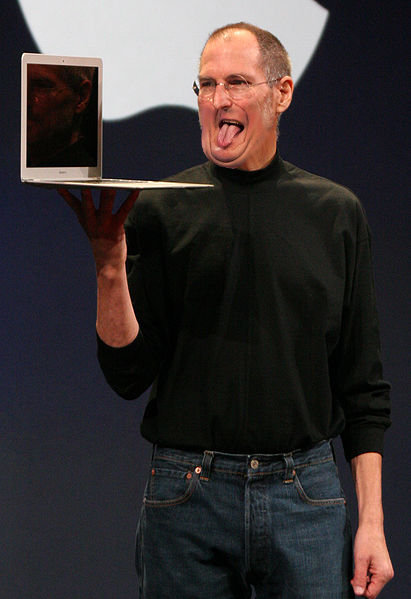
Original photo by Matthew Yohe, modified by Boycott Novell

Summary: The patent assault on GNU/Linux and Android carries on, although one of the chief players, Steve Jobs, is calling it quits amid struggles to block the competition (e.g. tablets with Linux)
“Apple plus Microsoft equals 100% of the desktop computer market. And so, whatever Apple and Microsoft agree to do, it’s a standard,” said Steve Jobs over a decade ago (see the video). Those two companies, Apple and Microsoft, are now collaborating (colluding) in their attacks on Linux. Might the Cook-led Apple be any different? We doubt it, but we can only hope. The MSBBC and pro-Microsoft lobbyists are pushing a distorted version of the story about Apple versus Samsung. For Apple, the decision was somewhat of a defeat, coming to light on the very same day that Steve Jobs decided to step down from his embargo company. If anyone needs proof that Apple is merely a marketing/branding company, it’s the reaction from investors to this man’s departure. Incidentally, since Samsung is on the receiving end of Apple’s thuggish behaviour, it is worth noting that in last night’s phone conversation that I had with OIN’s CEO (we spoke for almost an hour and a half, touching various issues) it turned out that Samsung (and possibly LG) is not paying Microsoft for Linux per se, so a small correction (error caused by Microsoft disinformation) ought to be made. While LG and Samsung are, according to Microsoft, paying Microsoft for Linux, it turns out that Microsoft just grossly exaggerated this for FUD purposes. The patent deals from 2007 were just for FAT patents. We wonder how many more of those “Linux” deals (e.g. Brother) are just phony extortions over some unwanted and arcane file system. In any case, Samsung and LG are not the sellouts Microsoft would have us believe they are. The interesting thing is, Android was beating iPhone around the time of iPhone 3. It seems likely that Android will beat iPad around the release of iPad 3, as well. No wonder Apple is so frantic and aggressive. The antitrust folks should really pay more attention to Apple’s reaction, possibly constituting a cartel.
Looking more closely at Samsung’s case, the prior art argument was being used properly [1, 2]. “Watch them wind around when confronted with truth,” writes Jan Wildeboer separately, regarding this response to Stallman's piece about the "unitary patent". Wildeboer, whose origin country helps a quick interpretation of the Apple-Samsung ruling, has also been trying to counter the FUD which came from pro-Microsoft lobbyist Florian Müller. This lobbyist pushed his FUD into some news sites. Some pro-patents sites are always looking for damning material that helps validate software patents too [1, 2, 3] while a Microsoft apologist continues to daemonise the Google-Motorola deal (this time using China), even a week after it all happened. Apple’s and Microsoft’s crusade for “Linux tax” is intended to make those new open source-based platforms that are so disruptive to them “uneconomic”, to use the word OIN’s CEO repeated a lot. Over in China, where intellectual monopolies are hardly respected, Microsoft is already infiltrating Linux to put Microsoft tax on it, as we explained twice this week. Quoting Sam Dean:
Microsoft will be involved with the deployment of NeoKylin Linux…
Yes, it’s just like another Novell, i.e. the ‘Microsoft Linux’ which Microsoft makes money from at the expense of Debian, Red Hat, and others. This is a point that OIN’s CEO and I seemed to have no disagreements on. Moreover, as he pointed out, there is clearly an attempt by what he labelled “duopolists” and “monopolists” to just remove competitors from the market. Android is their current target, but GNU/Linux on the server is another. We really must fight back on both fronts. One way is to challenge Android FUD and another is to antagonise Novell-like deals. █
Permalink
 Send this to a friend
Send this to a friend
08.23.11
Posted in Apple, Europe, Patents, Samsung at 11:21 am by Dr. Roy Schestowitz
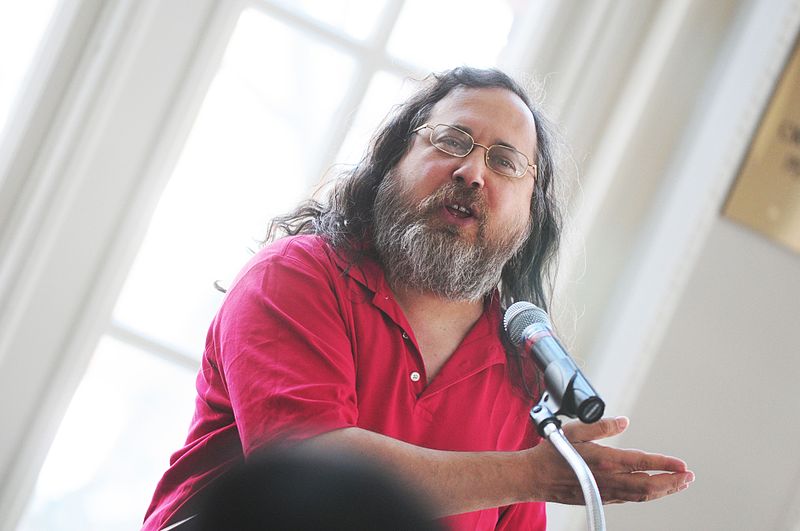
Summary: Richard Stallman further validates the FFII’s warning that Europe is besieged by the same forces who sought to legalise software patents in the whole EU just over half a decade ago
LAST year we warned that Amazon was trying to flush its software patents down the EPO's throat. Benjamin Henrion warns that “Amazon one-click patentable in Europe, EPO says add a computer and it will become patentable,” based on this blog post:
Amazon’s so called “One-Click Patent” is one of the most controversially discussed software inventions ever. The term, which nowadays is used as a cipher for a prototypical business method patent, was originally coined for US 5,960,411 titled “method and system for placing a purchase order via a communications network” (filed 12 Sep 2007, granted 28 Sep 1999; pdf), which has been enforced against competitor Barnes & Noble and licensed to Apple.
The respective teaching enables easy Internet shopping in that a customer visits a website, enters address and payment information and is associated with an identifier stored in a “cookie” in his client computer. A server is then able to recognize the client by the cookie and to retrieve purchasing information related to the customer, who thus can buy an item with a “single click”.
Europe is in a limbo and even hours ago people complained about it:
Read this patent GRANTED in Europe t.co/aaGAtfa then read this t.co/BxK8stq for more crappy #swpats
Richard Stallman has emerged from his more political commentary and contributed this article which warns about the “unitary patent” — the latest among many euphemisms used to silently push a pro-software patents agenda. To quote Stallman:
Just as the US software industry is experiencing the long-anticipated all-out software patent wars, the European Union has a plan to follow the same course. When the Hargreaves report urged the UK to avoid software patents, the UK government had already approved a plan that is likely to impose them.
Software patents are dangerous to software developers because they impose monopolies on software ideas. It is not feasible or safe to develop non-trivial software if you must thread a maze of patents. (See Patent absurdity, Guardian, 20 June 2005.)
Every program combines many ideas; a large program implements thousands of them. Google recently estimated there might be 250,000 patented ideas in a smartphone. I find that figure plausible, because in 2004 I estimated that the GNU/Linux operating system implemented around 100,000 actually patented ideas. (Linux, the kernel, had been found by Dan Ravicher to contain 283 such ideas, and was estimated to be 25% of the whole system at the time.)
[...]
The volunteer activists drifted away, thinking the battle won, but the corporate lobbyists for software patents were paid to stay on the job. Now they have contrived another sneaky method: the “unitary patent” system proposed for the EU. Under this system, if the European Patent Office issues a patent, it will automatically be valid in every participating country, which in this case means all of the EU except for Spain and Italy.
European patent lawyers are obviously unhappy about Stallman’s article. As Stallman warns about lobbying those aim is to get software patents approved in Europe, European patent lawyers label his allegation a “conspiracy theory” — a term whose usage we explained before.
This cheapening of Stallman’s views (which reached a lot of people through The Guardian, plus the “Slashdot effect”) actually comes from the group which is typically polite, German patent people like Falk Metzler (here is his latest agenda-pushing) and Axel H. Horns, who gets into an argument (after calling Stallman’s argument “conspiracy theory) with the FFII. He, along with pro-Microsoft lobbyist (Florian Müller), writes pro-software patents rhetoric and adds in relation to the “unitary patent” that:
On July 10, 2010, I had reported on the planned Organisation of work on the patent reform under the Polish Presidency. Now, as we still are within the summer recess period where nothing appears to move forward there might be a little stretch of time to contemplate as to how things might move on during next fall.
There is a recent precedent of successful adoption of enhanced co-operation in the EU: As we can learn from Wikipedia, with the rise in cross border divorce in the EU, common rules were put forward to settle the issue of where trans-national couples can divorce in the EU. However Sweden was blocking the new rules, fearing the loss of its liberal divorce law (divorce law differs strongly, with Nordic liberalism being in contrast to more conservative countries such as Malta which – until recently – did not even allow it). In order to allow those willing states to proceed without Sweden, in July 2008 nine countries put forward a proposal to use enhanced co-operation. At a meeting of the justice ministers on July 25, 2008, the nine states decided to formally seek the measure of enhanced cooperation; eight states formally requested it from the European Commission on 28 July 2008.
This is an interesting analysis (the author is typically informative), but why potray a so-called ‘unity’ patent as a good thing like peace-making? It’s not. All it does is, it increases damages in European industries and raises the frequency/impact of litigation, which helps the likes of the author, not real producers.
To give a very recent example of the toxic effects of US monopolies inside Europe, consider the Apple embargogate [1, 2, 3] , which fortunately turned out to be just an Apple scam that ended badly for Apple. To quote:
Apple faces a turnover of the Samsung injunction and iPad 3 may be delayed with screen supply problems
It was a black Wednesday for Apple. Samsung managed to overturn the European Union ban on sales of its flagship tablet, an action prosecuted by Apple, and the iPad 3 launch was “put back” because of technical problems.
Added to the news that if Google’s bid for Motorola Mobile goes through, Apple will lose some of its patents litigation power because of its reliance on Motorola technologies, it is probably not a good time to be in the Cupertino company’s boardroom.
Here is more about Apple lying to the court using fake 'evidence' to impose an EU-wise embargo of Linux-based products from Samsung. It is theorised that Samsung might buy WebOS from HP, but based on hirings, Samsung will stay with Android/Bada and distribute that without qualm all around Europe, although quite likely with a Microsoft tax. Samsung is one of the top patentors in Europe. █
Permalink
 Send this to a friend
Send this to a friend
08.21.11
Posted in Apple, Google, IBM, Law, Patents at 9:30 am by Dr. Roy Schestowitz

Summary: Clarifications and explanations regarding the goal of a (yet theoretical) patent reform that would actually prove to be effective
EVERY ONCE in a while, someone suggests an amendment to the systems we have in place. Law and governance forever evolve, or devolve. On the one hand there are lobbyists working at the behest of people who seek to distort the system for their client/s and on the other hand there are grassroots efforts to make the systems more sane and civilised. It is an eternal battle and the power that wins depends on the integrity of politicians. If politics expels lobbyists and abolishes cronyism, then the return on investment becomes too low for lobbying to remain a compelling option. Bill Gates and his friend Nathan (the world’s biggest patent troll) have been lobbying a lot recently to further perturb patent policy in favour of the billionaires. It is a tough battle in the US. We covered the issue many times before and showed that lobbying for the billionaires is shrewdly being disguised as helping “the little guy” (or gal).
“But spending money upfront for the chance of a better world is our job. And it’s the right thing to do.”
–Pascal-Emmanuel GobryTo confront or address this serious issue we must first define what the problems are. There is no single ‘camp’ here because some people want all software patents eliminated, some prefer to see only a portion of them (the “bad” ones) eliminated, and some just want to make patents work in favour of themselves or Linux (the "IBM way", maybe Google too based on its recent Android defence strategy).
Pascal-Emmanuel Gobry, a persistent critic of software patents as of late [1, 2, 3], makes suggestions for getting rid of patent trolls, which are more like a symptom than the main problem. Many of them use software patents and give the illusion that not only gigantic companies use patents to cause harm. “Every venture-backed startup needs to make a credible, public statement now: we will fight every patent troll case, to the Supreme Court if we have to,” suggests Gobry. “Every venture capitalist needs to make a credible, public statement: we will finance our portfolio companies’ cases against patent trolls. We recognize that it’s going to be a long, hard slog. We’re going to burn tons of money at first. But spending money upfront for the chance of a better world is our job. And it’s the right thing to do.”
Well, this is not the key problem and it “ignores they are *intended* part of patent system, though,” writes Georg Greve in relation to this article. Trying to pretend that getting rid of patent trolls is the only desired “reform” is what lobbyists of large companies have been doing. As we saw quite recently with Apple’s embargo threats and legal actions (with fake 'evidence'), the problem is not just bigger than patent trolls; it is bigger than software patents, too. Sometimes we have patent cartels. According to this new article, Apple continues to pursue patents. Here is the latest:
A patent application submitted by Apple has revealed its plans to turn the iPod and iPhone into a mobile karaoke system that can help to teach amateur singers how to hit the right pitch and key.
The bottom line is, large companies — not just patent trolls — are exploiting the USPTO to make themselves rich. This leaves more than 99% of the US public totally betrayed by this system that their government fosters. █
Permalink
 Send this to a friend
Send this to a friend
08.20.11
Posted in Apple, Courtroom, GNU/Linux, Google at 9:40 am by Dr. Roy Schestowitz
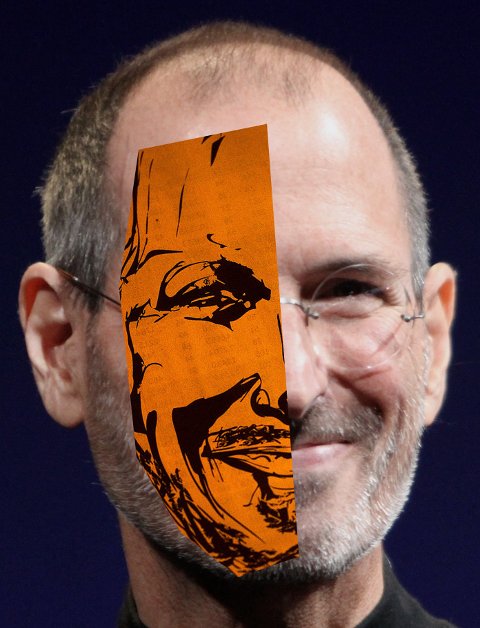
Jobs image licensed under the GNU Free Documentation License (version 1.2 or any later versions); Ellison patch By Thomas Hawk
Summary: Steve Jobs’ mob is systematically manipulating images that his lawyers submit as ‘evidence’ with which to ban Linux-based devices
LAST YEAR a Microsoft Lawyer said that Microsoft “covers up alleged misconduct, mischaracterizes evidence [...] protects the perpetrators and retaliates against victims.” A few days ago we saw that Apple too is perturbing the legal system with potential illegalities like Microsoft's. According to another report from Holland/USA [via], “In a court filing, Apple resized a photo of the Galaxy S smartphone to match the dimensions of an iPhone 3G” (not just its hypePad).
Microsoft got fined $40,000,000 for trial misconduct. Will Apple be filed for submitting evidence which it knew was fake? How about banning Apple rather than devices Apple wants banned, using fake evidence as an instrument that deceives/manipulates judges?
Apple: where gullibility is the business model. █
Permalink
 Send this to a friend
Send this to a friend
08.18.11
Posted in Apple, GNU/Linux, Google at 6:25 am by Dr. Roy Schestowitz

Summary: Balancing of patents between the Android side and the non-Android side ensures that Apple would have to reassess its embargo-to-compete strategy
APPLE’S empire is heavily built upon trademarks, probably more so than lock-in or any genuine technical merit. What Apple fears the most is that people may start realising that they overpay for junk they can get elsewhere for half the price and with twice the number of features. For Microsoft it’s the same problem, but rather relying on trademarks, Microsoft is relying on kickbacks, other dirty dealings, and technical lock-in. Linux is to proprietary software what the industrial revolution was to Luddites.
“Linux is to proprietary software what the industrial revolution was to Luddites.”While many know that this site is against Samsung, it is clear that when it battles against Apple over the use of Android, the decision may matter to a lot of companies which distribute Linux. “Samsung’s Lee eyes deals to boost software prowess,” writes Reuters, noting that “Lee made similar remarks in late July, urging managers to boost its software prowess, patent pools and talent at the firm’s annual event comparing Samsung’s vast product portfolios ranging from televisions, handsets and computers against those of its rivals.”
Notice the part about patent pools and mind the endless FUD about Google’s purchase of part of Motorola. The real news is that Google sought patent deterrence, not an Android monoculture. As one article put it, “the manufactures are tit-for-tatting over software patents, those ridiculous monstrosities of failed policy.” Mike Masnick’s headline was “Motorola Deal Showing Massive Loss To Innovation Caused By Patents” and Dr. Glyn Moody wrote:
I am really quite relieved Google is trying to acquire Motorola Mobility. Not because I think it will solve all the problems of Android – it’s far too early to say anything like it; but simply because, at last, Google has done something that might begin to address them.
I was fast coming to the view that Google was, if not completely clueless in the face of multiple patent assaults on its Android platform, at least pretty rudderless. When it eventually lost the battle for Nortel – after offering the most absurd bids that involved things like pi billion dollars – I really doubted it had any idea how serious things were getting.
The matter of fact is, Samsung is likely to become more heavily dependent on Linux, the main problem (or one among several) is that it pays Microsoft for Linux. The good thing is that Samsung — like HTC — is unwilling go do the same with Apple, whose embargo attempts against Galaxy Tab are failing [1, 2]. It looked very different earlier this month, but it didn’t last long for Apple.
Not so big now, are you Apple? █
Permalink
 Send this to a friend
Send this to a friend
« Previous Page — « Previous entries « Previous Page · Next Page » Next entries » — Next Page »


























 Content is available under CC-BY-SA
Content is available under CC-BY-SA